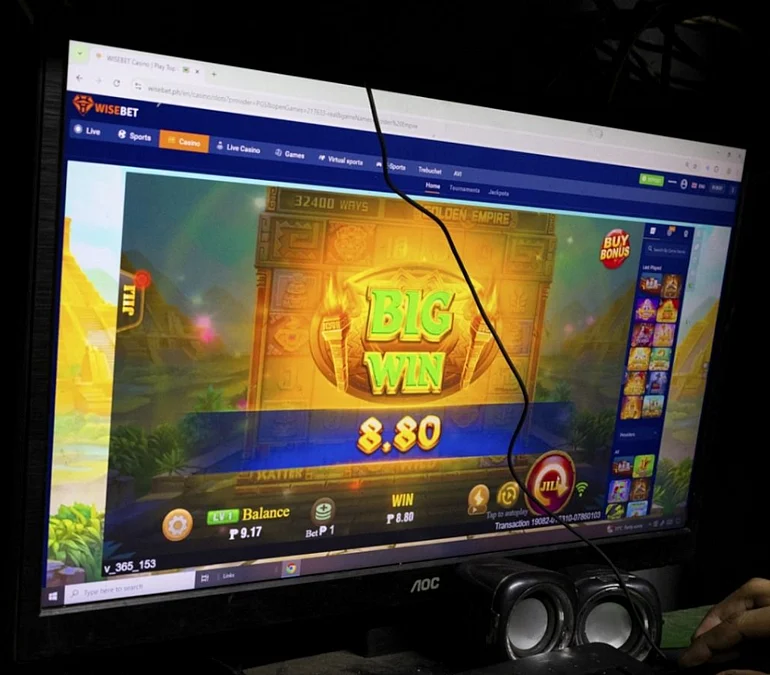By Jay Hilotin
Copyright gulfnews

Manila: Jessie Carlos, a former Department of Finance employee with a rank of “Tax Specialist I”, accumulated $81,000 (about ₱5 million) in gambling debts.He went berserk: Carlos opened fire at casino tables and slot machines killing 38 people and injuring 70+ others at the Resorts World Manila. He also stole chips..Illegal gambling platforms putting minors and youth at risk: Report.India seeks to ban online gambling; bill introduced in lower house.India: Andhra Pradesh declares online gambling games illegal.Vietnam police bust $1 billion illegal online gambling ring
.Carlos ultimately died by self-immolation. That was in 2017.Since then, online gambling has ensnared lives here with devastating consequences, with experts warning about harrowing cases and lives irreparably lost. The numbers are staggering: 8,000 online gambling sites have been shut down, according to local authorities.But it’s like a Hydra-headed creature: Thousands more sites, operated from outside the Philippines, have emerged in its place..$7.16 billionGross gaming revenue in the Philippines driven by e-games and integrated resorts.Not recognised as a public health issueGambling addiction is not yet officially recognised as a public health issue in the Philippines. Now experts point to a growing crisis, as online gambling addiction has emerged as a “mental health crisis”.Dr. Paolo Woodruff Gonzales, psychiatrist at the Institute of Psychiatry and Behavioral Medicine, Southern Philippine Medical Center (IPBM-SPMC) and director for Mindanao of the Philippine Psychiatrists Association, says the impact is severe.He recently treated a patient with ₱200,000 in gambling debts who had developed suicidal thoughts. Easy access to betting platforms and loan sharks worsens the situation.Mark, a 38-year-old finance executive, spiraled into addiction during the 2020 pandemic, losing over ₱20 million through loans from banks, credit cards, and loan sharks. He wagered up to ₱200,000 daily on online casinos, straining his marriage and leaving him with ₱5 million in debts. Similarly, a young man in Bukidnon driven by debts from playing “scatter” games, tragically took his own life, leaving his family in grief. During a Senate inquiry, the mother told lawmakers how e-gambling addiction led to the death of her 26-year-old son, who killed himself by hanging. These stories underscore the personal wreckage left by an industry that preys on vulnerability..32 millionEstimated number of Filipinos engaged in online gambling in one form or another.Why it’s dangerousAn estimated 32 million Filipinos — nearly one-third of the 112.73 million population — engaged in online gambling from January to May 2025, a 291% surge from 8.2 million in 2024, per PAGCOR data. Sports betting alone involves 38.9% of the population annually. Pre-ban POGOs employed 50,000-60,000 mostly Chinese workers, plus thousands of Filipinos in support roles. According to Dr. Gonzales, gambling addiction works much like substance addiction. It doesn’t help that fast digital cash transactions have become the norm across the southeast Asian nation. Loss of impulse control – patients can’t stop once they start betting.Financial spiral – debts pile up as gamblers borrow, sell belongings, or take loans to keep playing.Hidden struggles – many conceal their addiction for years, even from family members, until they hit “rock bottom.”Excessive online gaming has hit epidemic proportions in the Philippines, with nearly a third of the population involved in some form..Central bank tightens rules as depression spikesThe incidence of depression is also increasing in the country. The current correlational analysis evaluated the association between online game addiction and depression in Filipino adolescents.Since August, online gaming transactions in the Philippines have taken a nosedive — down by as much as 50% — thanks to the Bangko Sentral ng Pilipinas (BSP) ordering e-wallet companies to cut all links to online gambling sites, according to Pagcor. But don’t celebrate just yet. Pagcor Chair Alejandro Tengco shared that a twist in this tale is the rise of users flocking to “illegal” gaming sites, operating under the radar.BSP released an order August 14, signed by Deputy Governor Mamerto Tangonan, demanding e-wallets, banks, and other financial services to ditch all in-app gambling features. Tengco told Rep. Chel Diokno in a House hearing, “It’s really hard to go after them,” referring to these illegal operators. Why? Because about 60% of online gaming “happens” on foreign soil — in countries like Russia and Cambodia — where Philippine authorities struggle to reach. .Rogue platformsThese rogue platforms lure players with jaw-dropping bonuses — deposit P100,000, and they might throw back four or five times that amount in flashy incentives.Pagcor’s daily count clocks around 12,000 illegal online gaming sites compared to a mere 77 licensed ones in the country. Some notorious names dropped by Rep. Brian Poe include Popo Live, Awaz, Vone, Niki, Ximi Video Live, Gem Gala, Himme, and HiChat.Sneaky as they are, these sites pose as harmless entertainment or live streaming apps on popular platforms, but rake in an estimated $50 to $70 million every month from Filipino users — without paying taxes or following rules.If those eight platforms alone generated $1.4 billion annually, that’s a juicy P82 billion slipping right through the government’s fingers (based on the 30% tax share expected). Tengco admitted these illicit sites still openly operate within the Philippines, despite efforts from various agencies.8,000 sites shut downOn the bright side, collaboration among the Department of Information and Communications Technology, Cybercrime Investigation and Coordinating Center, and the National Bureau of Investigation has successfully shut down around 8,000 of these rogue operations. But the numbers keep bouncing back, proving there’s still a lot of work to do.In the meantime, while the legal e-wallets are cleaning house, the illegal operators continue to thrive, fueling addiction and dodging oversight — a tough game of cat-and-mouse that authorities are still playing for keeps..OppositionThe Catholic Church, a powerful voice in this predominantly Catholic nation of nearly 86 million faithful, has vehemently opposed online gambling. In July 2025, the Catholic Bishops’ Conference of the Philippines (CBCP) likened it to a “new plague or virus,” spreading silent slavery and destroying families. CBCP President Cardinal Pablo Virgilio David criticised the government for fueling addiction via the “digital highway” of the internet, where exploitation thrives. David argued that gambling becomes immoral when it leads to addiction or depletes family resources. The Church has long battled gambling, from denouncing former President Joseph Estrada’s involvement in illegal jueteng in the 1990s to urging parishes to aid victims and media to expose its harms rather than romanticise it. .CriminalisationDioceses like San Carlos and Bacolod echoed this in July 2025, calling for criminalisation of all online forms to protect youth from manipulative ads.The government initially promoted online gambling for economic gains – but has shifted toward crackdowns amid rising crimes. Under President Rodrigo Duterte from 2016, the Philippine Offshore Gaming Operators (POGOs) licensed firms to offer services abroad, boosting revenues but linking to human trafficking, scams, and money laundering. In July 2024, President Ferdinand Marcos Jr. announced an immediate ban on all POGOs during his State of the Nation Address, citing ties to murder, kidnapping, and torture. Executive Order No. 74, signed in November 2024, mandated closures by December 31, 2024, with task forces like the Presidential Anti-Organised Crime Commission intensifying raids. Despite this, domestic online platforms persist under regulation by the Philippine Amusement and Gaming Corporation (PAGCOR), which enforces self-exclusion programs, though critics say enforcement lags.The online gambling industry remains massive, even post-POGO ban. In 2024, gross gaming revenue (GGR) — total wagers minus winnings — hit a record ₱410 billion (about $7.16 billion), up 25% year-on-year, driven by e-games and integrated resorts..GDP contributionThe sector now contributes significantly to GDP, attracting high-rollers from China, Japan, and South Korea, though unregulated sites proliferate.Money flows swiftly and opaquely in this ecosystem. Players, mostly foreigners like Chinese nationals (where gambling is illegal except in Macau), deposit via e-wallets (GCash, Maya), credit/debit cards, or online banking for instant bets on e-casinos, sports, and bingo. POGOs, before the ban, funneled billions offshore: bets from abroad entered Philippine-licensed platforms, with winnings paid out digitally, often laundering illicit funds — 26% of ₱54 billion in 2017-2019 transactions flagged as suspicious. PAGCOR collected fees and taxes (₱24.5 billion projected for 2024), but much evaded via underground channels, supporting ancillary services like IT and streaming..Support hotlinesAddiction affects countless more: support hotlines report mostly online gamblers seeking help, with cases linked to depression, family breakdowns, and suicides. Psychiatrists like Dr Gonzales, note underreporting due to stigma, but the crisis is escalating, demanding urgent intervention beyond bans.



